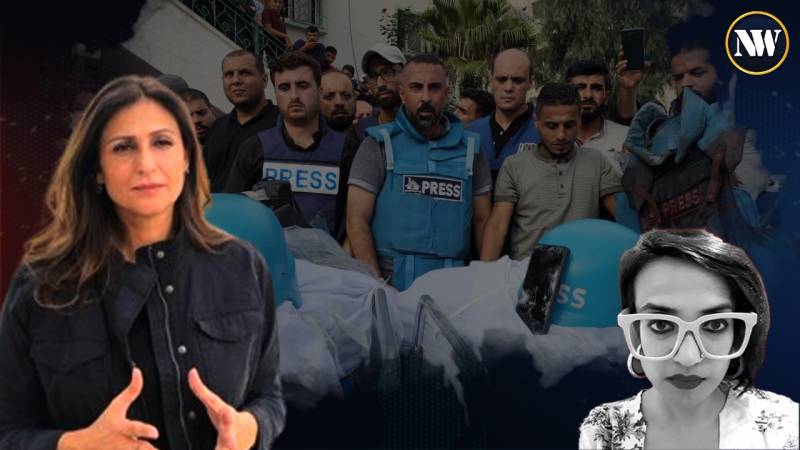In the crucible of conflict, journalists stand as frontline witnesses, tasked with the solemn responsibility of bringing truth to the world. However, recent events unfolding in Gaza and the West Bank have cast a harsh light on an alarming pattern - an unrelenting and systematic targeting of journalists.
The conflict in Gaza has reached unprecedented levels of intensity, a disturbing trend not only jeopardizing the safety and lives of reporters but also undermining the fundamental principles of press freedom. The Israeli military has launched indiscriminate bombings that have claimed thousands of lives, including civilians and children. Amid this chaos, journalists find themselves not only navigating the dangers of war but also being deliberately targeted.
Shuruq As'ad, the spokesperson for the Palestinian Journalist Syndicate, provides a stark revelation, stating, "This is a genocide for us because when you say we have 107 journalists killed in Gaza with the population of Gaza nearly 1,200, this means 9% of journalists killed in Gaza in only 90 days. We're losing at least one or two of our colleagues each day."
The deliberate targeting of journalists by the Israeli military is a deeply troubling tactic, resulting in the loss of colleagues who are merely doing their jobs. As'ad emphasizes the gravity of the situation, revealing that journalists are working in perilous conditions, donning safety vests and carrying press credentials, yet still falling victim to deliberate attacks.
The plight of journalists extends beyond the confines of Gaza, infiltrating the West Bank. As'ad sheds light on the challenges faced by journalists in this region, where a total closure since October 7th has restricted movement between Palestinian cities. "This is also another thing, so there was first of all the siege. Second, the treatment of soldiers for Palestinian journalists when they reached the checkpoints. We reported 360 attacks and mistreatment for journalists on the checkpoints since the 7th of October," explains As'ad.
Even in areas like Janine, where weekly demonstrations take place, journalists face direct threats from Israeli forces. As'ad recounts the harrowing experiences, stating, "We've been attacked every Friday, and they come to us – Special Forces, police, army. We have names of our colleagues who were badly beaten. We have names of our colleagues who were shot directly by snipers while only gathering on a hill or even being gathered in a demonstration. We are together usually with our crew – TV kit, everything – and away from demonstrators, and though they target us by tear gas, by bullets."
Furthermore, the closure of media offices, attacks on journalists, and the arrest of over 54 colleagues in the West Bank have created an increasingly hostile environment for those trying to cover the conflict objectively. Shireen Abule, a journalist targeted while reporting in Janine, has become emblematic of the challenges faced by journalists in the West Bank. The shocking statistics reveal that 34 Palestinian journalists are still in prison, illustrating the oppressive conditions under which they operate.
In response to the escalating crisis, the Palestinian Journalist Syndicate has issued a global urgent appeal for solidarity. As'ad emphasizes the need for the international community to recognize the dire situation journalists are facing and to exert pressure on decision-makers to protect their rights. She urges, "Stop Israel. Israel has to stop killing journalists, and journalists have the right to deliver the story. They have to be protected."
This call for solidarity comes at a critical juncture, where the relentless targeting of journalists has reached alarming proportions. The international community, especially fellow journalists, is called upon to end the misinformation surrounding the conflict. As'ad highlights the responsibility of journalists worldwide to report objectively, ensuring accurate information reaches the public. Criticism is directed at international journalist bodies for their alleged underreporting and biased coverage, leading to a skewed narrative that fails to capture the gravity of the situation.

